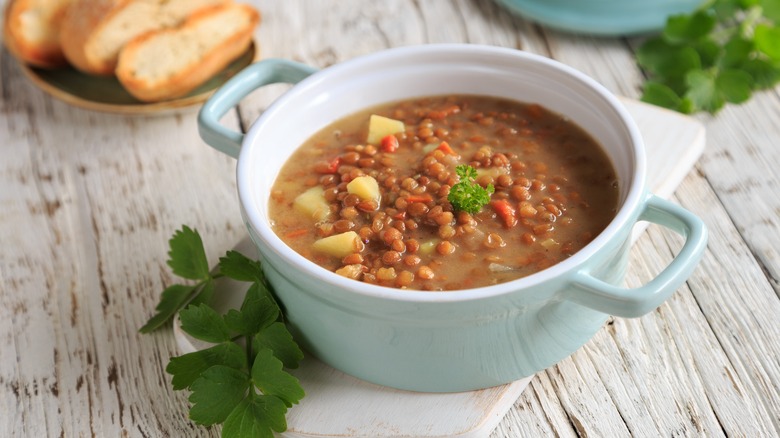Fix Soup That's Too Sweet Or Salty With A Splash Of Vinegar
When it comes to over seasoning, one of the easiest foods to mess up is soup, and one of the most frustrating too. While you probably have a good handle on how much salt or sugar most solid dishes need, soup has the double problem of being something that can reduce considerably as you simmer it, and usually having quite a few ingredients to boot. If your stock or another ingredient has too much salt in it already, or if you season your soup without accounting for evaporation, you'll end up with an inedible mess. And worst of all, it's something that is usually made in big batches, so you're looking at a lot of wasted ingredients and effort on your hands. Thankfully there's a one-size fits all solution in your pantry that will solve the problem of overly salty or sweet soup: vinegar.
It may seem too easy, but a few splashes of vinegar really can make your food taste less salty or sweet. The taste of vinegar is strong enough that it helps mask other overpowering flavors, and most soups benefit from a little acidity anyway. You can try just a dash or two at a time, taste your soup, and keep adjusting. You aren't actually reducing how salty or sweet your soup is, but you're balancing out the flavors and making those specific aspects less noticeable. Ultimately, that's what matters to your palate.
Vinegar can counteract salt or sugar with its own powerful flavor
Why does vinegar work so well at suppressing salt and sugar in soup? It comes down to how we process taste. The first thing to know is that the classic taste map of your tongue showing separate areas for salty or sweet is inaccurate. It's true that taste cells only sense individual sensations like sour or umami, but each taste bud contains around 100 taste cells of all varieties, and your ability to taste is actually spread evenly over the tongue. This means that competing flavors can overshadow each other; that's why chefs talk about "balancing flavors." The sweetness from a little sugar evens out the natural acidity of tomatoes in sauce, and the acidity of lemon juice does the same for fatty fish. Vinegar is particularly concentrated and potent, which makes it great for counteracting other tastes that are too strong.
Make sure you're using the proper vinegar in your soups. Distilled white vinegar is the most neutral tasting, and makes for a good option if you don't want to mess with the flavor of the dish, but you'd be missing out on some extra depth for your soup. Apple cider or malt vinegar are great choices for meat stews, while white wine and rice vinegar are better choices for lighter broths. Use the right vinegar and you can do more for your soup than just make it taste less salty or sweet.

